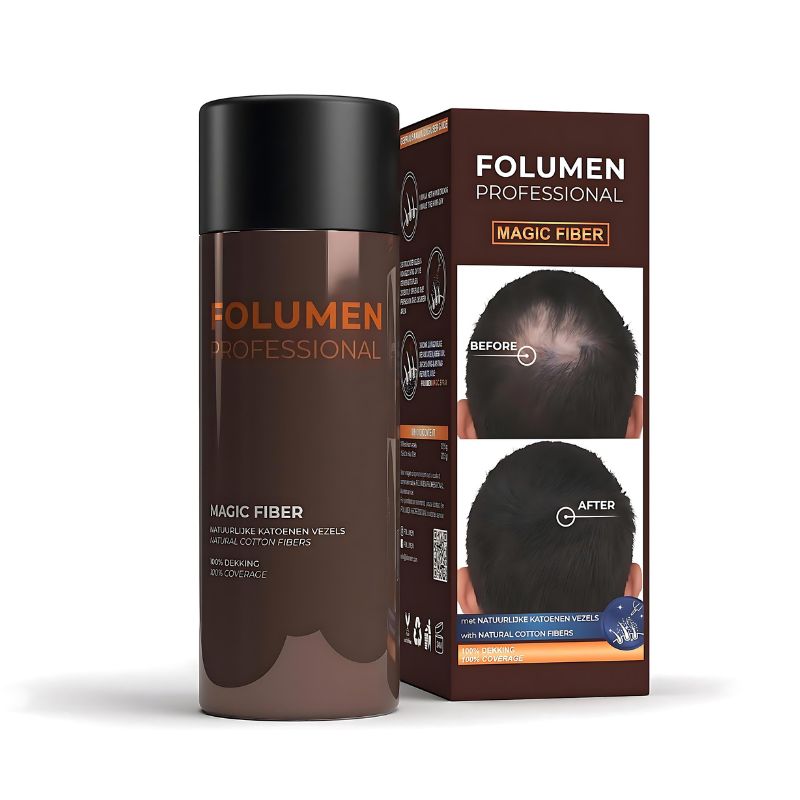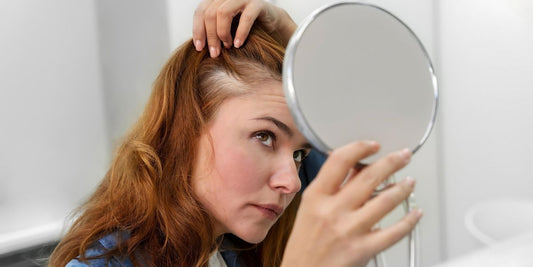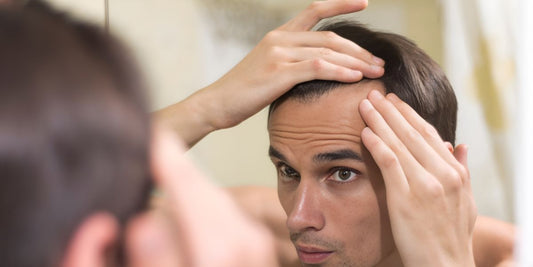Everything you need to know about hair loss and thinning hair
Hair loss and thinning hair can occur at any adult age and is characterized by various symptoms, such as fewer individual hairs, frizzy or flat hair, or an unhealthy scalp. Since every individual has a different hair type and experiences different problems, it is crucial that there is a suitable solution for every hair type and every problem.

Our health is often reflected in our hair. Poor nutrition or illness is often visible in the appearance of the hair; it becomes dull, fragile and prone to hair breakage. A healthy scalp supports healthy hair growth. That is why it is important to recognize the factors that play a role in hair loss and thinning hair and to address them with the right care. In this blog we discuss hair loss in men and women, the causes and symptoms, important substances and ingredients in food and hair products, customer experiences, and solutions to reduce hair loss.
-
Hair loss in women Every woman can suffer from hair loss. It is estimated that about 50% of women experience hair loss. Characteristic of hair loss in women is that the growth phase of the hair slows down and it takes longer before new hair starts to grow. The hair follicles shrink because there is less blood flow to the hair follicles, so that nutrients can no longer reach the hair. This causes the hair to become thinner, finer and more susceptible to hair breakage and hair loss. Women often experience hair loss spread throughout the scalp, starting at the parting line. Balding is rare in women, but the head of hair can become significantly thinner.

-
Hair loss in women is more common in:
- Women over 40
- Women in the postnatal phase
- Women who have had medical treatment, such as chemotherapy, or are taking certain medications
- Women with hairstyles that are pulled too tightly
- Women in and after menopause
Types of Hair Loss in Women:
- Anagen effluvium: hair loss caused by medical treatment or medications, such as chemotherapy.
- Telogen effluvium: hair loss caused by stress or a traumatic experience.
- Alopecia universalis: almost complete loss of body hair.
- Androgenetic alopecia: hereditary baldness due to hormonal fluctuations and dihydrotestosterone hormone.
Recognizable signs of hair loss in women:
- More hair in the brush, on the pillow, on the floor or in the shower every day
- Thinning spots on the scalp
- Less thick and full hair than before
- Hair breaks off easily at the hair root
-
Hair loss in men Hair loss in men has various causes. The majority of men experience a receding hairline or thinning hair at the crown around the age of 50. Typically, hair loss in men often starts at the front of the head and slowly spreads to the back. About 95% of hair loss in men is genetic, known as hereditary baldness.

Types of hair loss in men:
- Androgenetic alopecia: hereditary baldness due to hormonal changes.
- Telogen effluvium: hair loss caused by stress.
- Alopecia areata: patchy baldness that can occur in random places.
- Alopecia universalis: almost complete loss of body hair.
-
Hair loss: understanding the growth phases of hair The growth process of hair consists of three phases: anagen (growth phase), catagen (transition phase), and telogen (resting phase).
-
Causes and Symptoms of Hair Loss, Hair Shedding, and Thinning Hair Hair loss can be caused by heredity, stress, lifestyle, diet, hormonal changes, medical problems, and environmental factors such as scalp problems, illness, medications, stress, diet, lifestyle, and seasonal influences.
-
Hair products against hair loss: what do I need? FOLUMEN ® is a well-known brand for thinning hair, inspired by high-end skin care. Their products are developed to strengthen, condition and repair hair from within, with ingredients such as water, sulphates, preservatives, caffeine, and various patented technologies such as BioAMP and Transactive Delivery System.
-
Less hair loss: further solutions and treatments Other treatments for hair loss include hair growth products, hair therapies such as mesotherapy and light and laser therapy, hair transplants, and medication.
Conclusion : Whether you are a man or a woman, hair loss can be a major problem that affects your self-confidence. Fortunately, there are plenty of solutions available, from medication to lifestyle changes, depending on the cause and severity of the hair loss. It is important to consult a professional for advice and treatment if problems persist. And remember, a healthy lifestyle, good nutrition and avoiding stress can also help maintain a healthy head of hair.






